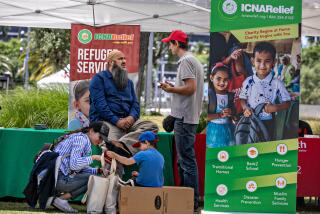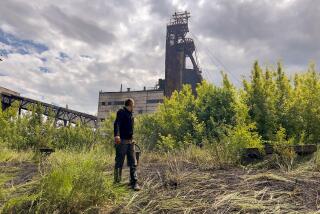Bosnians Have a Dream Of a New Life Elsewhere
- Share via
KAKANJ, Bosnia-Herzegovina — When his back pain flares, the teenager stops working and closes his eyes. For a moment, dreams of a faraway world replace the harsh reality of the coal mine.
“What is the easiest job in America?” asks Kenaid Cisic, whose brother recently moved to Minnesota. “Maybe I can be a cab driver. That shouldn’t be a hard job, and I would get to see the country.”
Kenaid, 15, is virtually the sole provider for his four-member family. His job is illegal. On weekday evenings and weekends, after the real workers at Kakanj’s surface coal mine go home, he and up to 30 others sneak in to scavenge coal that they then sell.
They belong to the army of jobless in postwar Bosnia, where the unemployment rate is above 70% and most families turn to the black market to eke out a living. Even those with jobs are far from happy.
Members of the educated class who made the equivalent of $1,700 a month before the war now must settle for one-tenth that. Many of those who were on the lower end of the income scale have fallen off altogether, becoming beggars or creating black-market “jobs” like Kenaid’s.
Many Bosnians share the same dream: to leave forever.
That worries the government, which fears losing intellectual potential. It also concerns countries that accepted half of Bosnia’s 4.3 million people as refugees during its 3 1/2-year war and now are eager for them to go back home.
Kenaid is the youngest of those who scavenge up to a ton or more of coal a day in Kakanj, 20 miles northwest of Sarajevo. Sympathetic mine officials apparently wink at the practice.
Medan Kustura is 37 but looks much older. A refugee from eastern Bosnia, the former forestry technician also regularly “works” after hours at the coal mine.
“I had to adjust to the times,” he says.
The mine sells a ton of coal for $44 to $56, while the scavengers get about $11 on the black market. Kenaid claims he once collected three tons in 24 hours. “But I got ill after that,” he says.
Along with the small amount of money his father occasionally earns repairing cars, all the boy’s money goes to his family, and still is barely enough to make ends meet. A family needs $220 a month to barely scrape by.
Mugdim Huska, 20, gathers coal to provide for his parents and two sisters. As long as it’s chilly, people will need coal, he says. But he wonders how his family will survive the summer. He hopes to “get lucky” and get a difficult-to-obtain visa to travel to Germany.
Kenaid’s older brother, Asmin, left for Minnesota last year with his wife and two children, under a limited-entry U.S. immigration program.
“Asmin promised he will come back and take me out to Minnesota,” Kenaid says, rubbing frigid hands that look too old to be a teenager’s. “When I’m tired, I imagine I’m there, sitting and resting or playing basketball with my companions.”
Soon he stirs from his daydream, slides a hand over his dirty face and starts pushing his overloaded wheelbarrow. It topples. He sighs and gathers the same slices of coal again.
“Sometimes I can’t bear it anymore,” Kenaid says. “I feel like just throwing everything away, kicking it, going home, never to come here again.”
More to Read
Sign up for Essential California
The most important California stories and recommendations in your inbox every morning.
You may occasionally receive promotional content from the Los Angeles Times.












